UConn Today (Neag School’s Educational Psychology project places second University-wide in annual Giving Day)
UConn Expert Discusses Restraint and Seclusion in Public Schools
UConn Today (Brandi Simonsen is interviewed about the use of restraint and seclusion in public schools)
UConn Expert Discusses Restraint and Seclusion in Public Schools
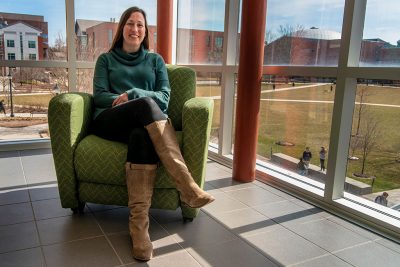
Editor’s Note: This piece originally appeared on UConn Today.
As federal lawmakers prepare to debate legislation greatly reducing the use of restraints – and eliminating the use of seclusion – in public schools, a recent hearing of the U.S. House of Representatives Subcommittee on Early Childhood, Elementary, and Secondary Education focused on the use of restraint and seclusion and featured testimony from UConn expert George Sugai. We asked Brandi Simonsen, a professor of special education in UConn’s Department of Educational Psychology at the Neag School of Education and co-director of the Center for Behavioral Education and Research, about the use of restraint and seclusion and whether the federal government has a role to play in regulating their use in public schools.
Q: This is an understandably emotional topic for people. How common are restraint and seclusion in American public school classrooms today?
A: Restraint and seclusion are not common in public school classrooms. However, it’s difficult to know exactly how often they occur, because the definitions and reporting requirements vary by state, and sometimes by district. The best estimate of how frequently restraint and seclusion are used comes from the Civil Rights Data Collection (CRDC), which includes reported data from almost every public school in the U.S. As summarized in the CRDC, 0.2% of all students experienced a crisis intervention – meaning restraint or seclusion – during the last data collection period, which was from 2015 to 2016, and approximately 71% of the students restrained and 66% of those secluded were identified with disabilities under the Individuals with Disabilities Education Act, also known as IDEA.
“It’s critical that educators understand that behavior is a form of communication. That is, behavior serves a function. Students use their behavior to communicate that they want to get something – like attention or an activity – or that they want escape or avoid something.”
— Professor Brandi Simonsen
Q: What does research tell us about any potential emotional or psychological impact on students from the use of restraint and seclusion in the classroom?
A: The long-term effects of restraint and seclusion have not been well-studied. We often hear about egregious abuses of these practices in the news, and we assume experiencing restraint and seclusion is likely traumatic for students, educators, and families. So, while we don’t have great data about the long-term effects of restraint and seclusion, we know quite a bit about the long-term effects of trauma on people’s mental, behavioral, and physical health, cognitive functioning, and overall well-being.
Q: Are there situations or circumstances where restraint or seclusion are appropriate?
A: Restraint and seclusion should only ever be used in a crisis situation, when there is a risk of serious and imminent danger and the restraint or seclusion reduces that risk. These are not planned or therapeutic interventions. They should never be a routine part of a behavior support plan, or used as a consequence for behavior. With preventive and positive behavior supports in place, many minor problem behaviors are handled quickly and efficiently, and the likelihood of more serious behavior is reduced. However, even when the best preventive practices are in place, emergency situations arise, so it’s very important that schools have procedures in place to respond to behavior-related emergencies.
Q: What are the alternatives to restraint and seclusion in the classroom?
A: Prevention is the best alternative. Once a crisis occurs, educators have likely run out of really good options. At best, educators’ goals should be to de-escalate the situation and maintain safety for everyone involved. But in some cases, a crisis intervention does become necessary to maintain safety. So the best alternative to restraint and seclusion is to prevent a crisis situation from happening. How do we do that?
To start with, positive, proactive, and preventative behavior intervention strategies are critical to support all students, but are especially important to prevent escalating situations with students who have a history of these behaviors, including students with disabilities. So, things like having expectations for students, explicitly teaching social and emotional skills, and providing specific feedback to students on their behavior – finding opportunities to celebrate their accomplishments – create an environment that functions as a “protective factor” for students with a history of challenging behavior.
Then, it’s critical that educators understand that behavior is a form of communication. That is, behavior serves a function. Students use their behavior to communicate that they want to get something – like attention or an activity – or that they want escape or avoid something. So, it’s critical that we teach them a more appropriate way to meet this same function, and then make other adjustments to the classroom and school environment to set these students up for success. Some of these adjustments are simple. For example, providing reminders, establishing predictable routines, adjusting academic instruction and tasks, and arranging the environment to ensure the replacement skills “work” for the student are all simple strategies that increase the likelihood of a student being successful and reduce the likelihood of a crisis situation.
To effectively put these types of practices in place, educators need training and ongoing support. In fact, when we look at the research on decreasing restraint and seclusion in schools, professional development is often a part of successful efforts. If a crisis does happen, we need well-trained staff to calmly de-escalate the situation and, then if necessary, move to crisis intervention.
But overall, prevention is the focus of how we set up our schools and classrooms, how we develop interventions to support students with a history of challenging behavior, and how we respond after a crisis to ensure that both students and educators are more likely to be successful the next time.
Q: Are states equipped to address issues surrounding restraint and seclusion in the classroom, or is additional federal intervention necessary?
A: States vary in the level of policy, guidance, and preparation provided to districts and schools. Federal intervention, such as the proposed Keeping All Students Safe Act, may be helpful. The challenge, as you pointed out, is that this is an emotionally charged topic, so it’s critical that experts help legislators understand the nuances – which were reflected in Dr. Sugai’s recent testimony to Congress – that are involved in implementing restraint and seclusion procedures. This mean promoting positive and proactive supports for all students and intensifying those supports to meet the needs of students with a history of challenging behaviors. It also means providing broad-based staff training in those positive and proactive supports and de-escalation strategies, and then providing more targeted staff training in safely and ethically using crisis responses in real cases of serious and imminent danger. And the final, important part involves monitoring, evaluating, and communicating any use of crisis responses.
As an example of federal guidance, the U.S. Department of Education developed the 2012 Restraint and Seclusion Resource Document, which is a great example of highlighting the conditions under which crisis responses may become necessary, but also emphasizing the importance of prevention.
Q: Experts at UConn have been at the forefront of this issue. Can you explain the work currently underway to improve approaches to behavioral intervention in schools?
A: Given the importance of prevention, most of our work at UConn focuses on Positive Behavioral Interventions and Supports (PBIS). I am fortunate to co-direct the National Technical Assistance Center on PBIS, along with partners from the University of Oregon, University of South Florida, and University of Missouri. The PBIS Center just began its twenty-first year, and the next five years (2018 through 2023) represent a $32.6 million federal investment to define, develop, implement, and evaluate a multi-tiered approach. This new approach will improve the capacity of state and local education agencies and schools to establish and sustain the PBIS framework in order to improve supports and outcomes for students with or at-risk for disabilities, and to enhance school safety and learning conditions that promote the well-being of all students.
There are preliminary published case studies that indicate that implementing sound behavior support practices within a PBIS framework may reduce the use of restraint and seclusion for students that have challenging behavioral histories. The National Technical Assistance Center on PBIS will be working over the next five years to continue to explore this topic, and develop resources to support educators in reducing the need for restraint and seclusion.
For more information on the National Technical Assistance Center on PBIS, please visit www.pbis.org.
| About the Expert Brandi Simonsen 860-486-2763 brandi.simonsen@uconn.edu Professor of special education with tenure in the Department of Educational Psychology at the Neag School of Education. Co-director of the Center for Behavioral Education and Research at UConn. Co-director of the National Technical Assistance Center on Positive Behavior Interventions and Supports. Senior Advisor to the National Center on Intensive Interventions. Simonsen conducts research, publishes, teaches, and provides training/technical assistance in the areas of school and class-wide Positive Behavior Interventions and Supports (PBIS), positive and proactive professional development supports for teachers, and applications of PBIS in alternative education settings. Education MS in Special Education: Exceptional Learner, University of Oregon, 1999 BA in Elementary Education and Psychology, William and Mary, 1998 |
Related Stories:
Cashing in on Charter Schools
NorthJersey.com (Preston Green is quoted on the disappearance of tax dollars into New Jersey’s flawed charter school system)
Neag Ranks High in Graduate School List
Willimantic Chronicle (Dean Kersaint quoted)
Seven Neag School Alums Honored at 21st Annual Awards Celebration
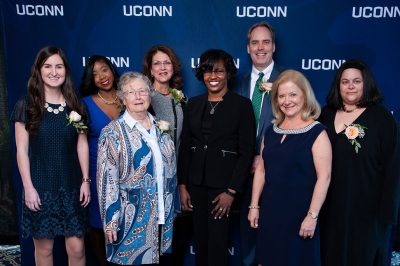
The Rome Commons Ballroom at UConn’s Storrs campus was filled on Saturday evening with Neag School of Education Alumni Board members; Neag School faculty, staff, and administrators; friends of the University; and guests honoring seven distinguished Neag School alumni at the School’s annual Alumni Awards Celebration.
“Tonight, we are celebrating this event for the 21stconsecutive year, thanks to the Neag School Alumni Board. We are grateful to the Board’s past and present members for their continued support in making this annual celebration possible,” said Dean Gladis Kersaint during her welcoming remarks.
Prior to the presentation of the 2019 Alumni Awards, emcee Joseph Macary, three-time Neag School graduate, Alumni Board president, and superintendent of Vernon (Conn.) Public Schools, recognized three additional award recipients on behalf of the Board.
The Neag School Alumni Board Scholarship, funded by Neag School alumni and friends to support students in their higher education pursuits, was presented to two Neag School graduate students, Ashley Robinson, a third-year doctoral student in the learning, leadership, and educational policy program, and Tashua Sotil, a two-time UConn alum currently seeking her sixth-year degree in educational psychology.
In addition, the Alumni Board recognized the recipients of the Dr. Perry A. Zirkel Distinguished Teaching Award, a $1,000 award granted to a Neag School faculty member who demonstrates excellence in teaching, and the 2019 Rogers Educational Innovation Fund Award, a $5,000 award to support an innovative classroom project conducted by one elementary or middle school teacher in Connecticut each year.
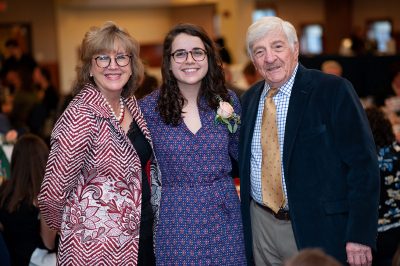
Jennie Weiner, assistant professor of educational leadership at the Neag School, received the Dr. Perry A. Zirkel Distinguished Teaching Award.
Two-time Neag School alumna who currently serves as an educator for Norwalk (Conn.) Public Schools, Jessica Stargardter, received the second annual Rogers Award, which will support her project, “An Eye for Change: Real-World Investigations through Photojournalism.” The project will provide students with tools, including disposable cameras, to document challenges and propose solutions within their community.
“The generosity of every one of our benefactors is deeply appreciated,” said Macary. “Their contributions are absolutely vital in providing our talented students, faculty, and members of the educational community with much-needed financial support.”
View photos from the Alumni Awards Celebration on Facebook.
Following dinner, seven Neag School alumni were recognized in the following categories, with each awardee being featured as part of a special profile video series and then giving brief remarks:
Outstanding Early Career Professional
Victoria M. Schilling ’16 (ED), ’17 MA
Science Teacher, Ellington (Conn.) Middle School
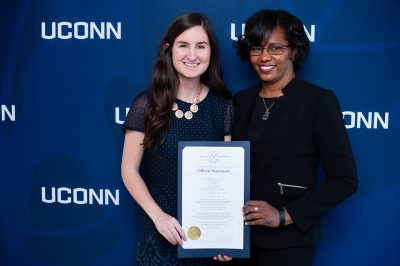
Victoria M. Schilling is a two-time graduate of the Neag School of Education, receiving her bachelor of science in secondary education in 2016 and her master of arts in curriculum and instruction in 2017. During her time as a graduate student, Schilling co-led the UConn Mentor Teacher Collaborative and served as an intern at Mansfield (Conn.) Middle School, where she helped implement units of instruction under Next Generation Science Standards (NGSS) into the curriculum.
In addition to serving as a science teacher, Schilling led a middle school curriculum development project at the Neag School this past summer that focused on the Carl and Marian Rettenmeyer Army Aunt Guest Collection funded by the National Science Foundation. Schilling has also co-authored three STEM Teaching Tools for stemteachingtools.org, where she has shared her techniques for implementing NGSS into science curricula.
“When I was in eighth grade, I had a dream to go to UConn and become an eight-grade science teacher — and here we are,” said Schilling during her remarks.
Outstanding School Educator
Deidra Fogarty ’05 (ED), ’06 MA
Special Educator for the Knowledge is Power Program (KIPP) Spring Academy, Washington D.C.
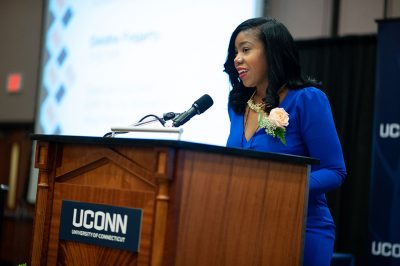
After receiving her bachelor of science in elementary education in 2005 and her master of arts in elementary education in 2006 from the Neag School, Deidra Fogarty moved to Maryland to begin her career as an elementary school educator before moving on to work in literacy coaching and administrative leadership at public schools in Washington, D.C. There, Fogarty now serves as a special educator for the Knowledge is Power Program’s Spring Academy, where she works to ensure student needs are met in special education and general education classrooms.
Fogarty expanded her role in educational leadership by founding Black Girls Teach, an online community for black female educators, as well as co-founding a diverse children’s book subscription with her sister Georgette, which is called WAM! Book Bundleaimed at empowering underrepresented children.
“I remember stepping into the classroom like ‘Wow, OK, I can do this,’ and I felt 100 percent confident and ready — all of this because of my experience here at UConn with the Neag School of Education,” Fogarty told the audience on Saturday.
Outstanding School Administrator
Maureen F. Ruby ’77 (CLAS), ’78 MS, ’82 DMD, ’07 Ph.D.
Assistant Superintendent, Brookfield (Conn.) Public Schools
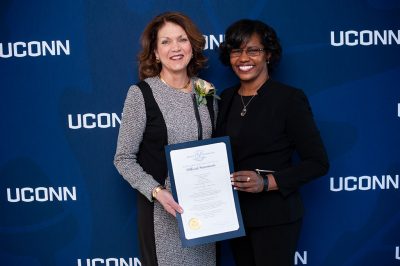
Maureen Ruby is the assistant superintendent at Brookfield (Conn.) Public Schools, where she oversees the curriculum, instruction, and assessment plans for all K-12 content areas, along with facilitating professional development. In her commitment to support English language learning, special education, and social-emotional learning, Ruby received a $700,000 five-year federal School Improvement Grant for Brookfield High School to implement two academic systems, one for special education and one for reading instruction.
She received her bachelor of science from the College of Liberal Arts and Sciences in 1977, master of science at the School of Engineering in 1978, doctorate in dental medicine from the School of Dental Medicine in 1982, and Ph.D. in special education in 2007, all from UConn.
After her career in dentistry, Ruby returned to school to receive a master of science in elementary education from Southern Connecticut State University in 1996. She served as a kindergarten through third-grade teacher at public and private schools across Connecticut prior to holding faculty positions teaching special education courses at three Connecticut universities. She then served in administrative roles at New London and Norwalk (Conn.) Public Schools prior to her current administrative role at Brookfield Public Schools.
“I think that more than the actual learning, it’s the caring that we feel when we work together,” said Ruby as she as she spoke of the relationships with colleagues, parents, and students that she has built at UConn.
Outstanding School Superintendent
Craig A. Cooke ’01 6th Year, ’07 Ph.D.
Superintendent, Windsor (Conn.) Public Schools
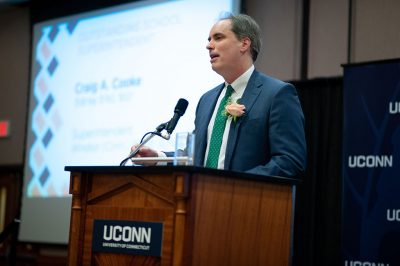
Under Craig Cooke’s leadership as the superintendent of Windsor (Conn.) Public Schools, enrollment totals and graduation rates have increased every year for the past five years. Cooke has worked to increase student achievement in Windsor Public Schools by implementing a 1:1 device initiative for all K-12 students and opening the Windsor Public Schools Office of Family Engagement and Community Partnership.
Cooke earned his 6th Year teaching certificate in 2001 and his Ph.D. in educational leadership in 2007, both from UConn’s Neag School. He served as the human resource director for Enfield (Conn.) Public Schools and later as the assistant superintendent of human resources for Windsor Public Schools prior to his current superintendent position.
“UConn has been so instrumental in my life and for education, there was no [other] choice for me when it became time to figure out where I was going to get my Sixth Year and my Doctorate,” says Cooke. “At UConn, I’ve had just tremendous professors and connections.”
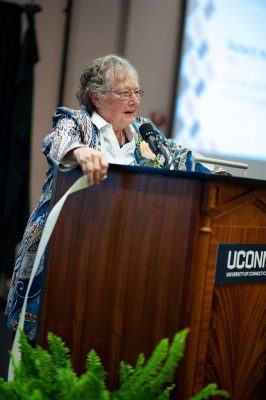
Outstanding Professional
Rachel R. McAnallen ’10 Ph.D.
Global Math Educator and Enthusiast, known as ‘Ms. Math’
Rachel McAnallen served as a teacher, a math department chair, a school board member, and a high school administrator before receiving her Ph.D. in educational psychology from UConn’s Neag School at age 75. While at UConn, McAnallen researched math anxiety among educators and now travels the world as ‘Ms. Math’ to share her passion for math and teaching, and to demonstrate ways for students and teachers to reduce math anxiety.
Along with presenting staff development workshops in countries such as Dubai, South Africa, and Canada, McAnallen also presented for many years at UConn’s Confratute,a weeklong event that draws educators from around the world to the Storrs campus.
“For 35 years, UConn has been wonderful to me,” said McAnallen after sharing stories of her mentors at the University.
Outstanding Higher Education Professional
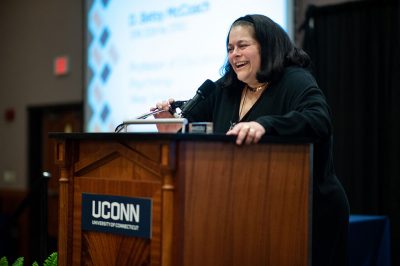
D. Betsy McCoach ’01 MA, ’02 6th Year, ’03 Ph.D.
Professor of Educational Psychology, Neag School of Education
After receiving her master’s degree in 2001, 6th year certificate in school psychology in 2002, and Ph.D. in educational psychology in 2003, all at UConn, D. Betsy McCoach applied to and received a teaching position at UConn’s Neag School. For more than 15 years, McCoach has served as a faculty member in the Neag School’s educational psychology department, teaching graduate-level courses in latent variable modeling, quantitative research methods, measurement, and instrumental design. McCoach is also the coordinator for the Research Methods, Measurement, and Evaluation graduate program at the Neag School.
In addition, McCoach directs two methodological summer conferences at UConn; serves as the co-principal investigator for a $3 million National Science Foundation grant and a $5 million National Center for Research on Gifted Education grant; provides curriculum and instruction support as a member of the Technical Advisory Board for the Educational Records Bureau; and authors educational texts, including 100 peer-reviewed journal articles and 25 book chapters.
“I fell in love with instrument design. I fell in love with latent variables,” joked McCoach on Saturday. “I love gifted education … I love research and research methodology. I love academics. I love higher ed. I love learning, and so I decided to extend my stay [at UConn] and pursue a joint Ph.D. in school psychology and gifted education.”
Distinguished Alumna
Carla S. Klein ’72 (ED)
Emeritus UConn Foundation Board Member, Co-Founder of UConn’s Women and Philanthropy Initiative, Retired Teacher, and Philanthropist
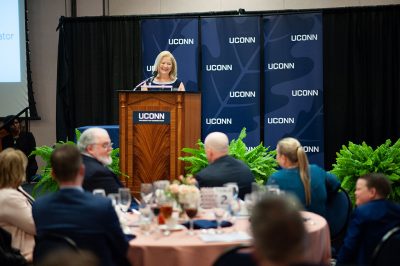
Carla S. Klein received her bachelor of science from UConn’s Neag School in 1972 and served as a longtime schoolteacher in the Stratford and Trumbull (Conn.) school systems. Klein was instrumental in enhancing school achievement in Connecticut, serving on the Connecticut Commission on Educational Achievement and the Bridgeport Public Education Fund board of directors, as well as being the former co-chair of Operation Respect Connecticut.
Together with her husband, John, former president and CEO of People’s United Bank, Klein supported educational programs across Connecticut, including anti-bullying initiatives. Following her husband’s passing from esophageal cancer in 2008, Klein continues to support educational causes through her role as a philanthropist, a co-founder of UConn’s Women and Philanthropy Initiative, as well as a leader in supporting causes including esophageal cancer research and prevention.
Along with her two children, Eric and Kristen, Klein established the Klein Family Scholarship Fund, which, beginning this fall, will provide financial support to academically talented Neag School students who wish to pursue a career in teaching.
“UConn was always at the top of the list as a university that I would want to continue to give to,” Klein shared on Saturday. “I couldn’t be happier to support professors and students, and I think it’s so important now because students, especially women, start out a new job and they have this huge bill to pay for their education, so it’s a wonderful way for me to give back.”
Cooper Issues New Book: From Exploitation Back to Empowerment
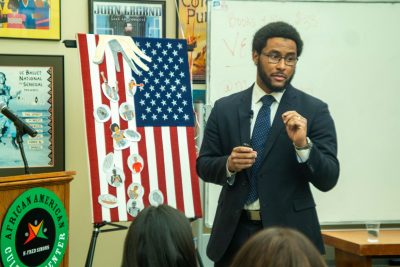
Fellow faculty members, students, alumni, family, and friends last month joined Joseph N. Cooper, assistant professor of sport management in the Neag School, to celebrate his newly released book, From Exploitation Back to Empowerment: Black Male Holistic (Under)Development Through Sport and (Mis)Education (Peter Lang, 2019), inspired by his research on the intersection between sport, education, race, and culture and the impact of sport involvement on the holistic development of Black male athletes.
“Socialization processes that miseducate us can lead to our exploitation, can lead to our holistic underdevelopment, not only as individuals but as a collective community,” Cooper said as he introduced his book during the launch event held at UConn’s H. Fred Simons African American Cultural Center in Storrs.
Cooper’s wife, Monique Cooper, a career consultant at UConn’s Center for Career Development, provided introductory remarks, which were followed by a presentation of the book cover art by the artists, UConn alumni Taylor Mayes and Steve Cartagena; a book talk by Cooper; a moderated Q&A; and a book signing.
“Socialization processes that miseducate us can lead to our exploitation, can lead to our holistic underdevelopment, not only as individuals but as a collective community.”
— Joseph N. Cooper, assistant professor of sport management
Cooper credits his family, who he says raised him with the value of education and instilled in him the importance of being an active agent of change, as the motivators that led him to write this book. He says he also took inspiration from scholars and activists, such as Harry Edwards, author of The Revolt of the Black Athlete and founder of the Olympic Project for Human Rights, as well as athletes who used their careers as a means to pursue social justice, such as Paul Robeson, Muhammad Ali and Arthur Ashe.
“From an early age, it was instilled in me the importance of being an active agent of change, and I felt like writing a book that was going to be able to be disseminated to a wide range of people would be a means to do that,” said Cooper, who also serves as the faculty founder of Collective Uplift, an organization designed to empower and support minority students through education and resources that will help foster their holistic development within athletics and beyond.
Furthering the Conversation
Cooper says he recognized a need for a more complex conversation about Black male holistic individuals who participate in sport and about the heterogeneity of their lived experiences. Writing the book provided a way for Cooper to open up that conversation and discuss the monolithic and stereotypical perceptions of Black males, including the “dumb jock” perception that stereotypes Black males as being athletically gifted and intellectually inferior.
At the same time, the book highlights strategies for holistic development and collective uplift not only for Black males, but also the Black community at large. Cooper offers strategies for Black male holistic individuals, their families, and communities to counteract the oppressive nature of society, such as beginning the empowerment of Black males in the household at a young age and treating sporting events as a means for sharing information and addressing social problems, rather than solely for entertainment.
He also provides recommendations for transforming youth sports into a space that informs young people about activism and advocacy to facilitate social change — for instance, by implementing mentorship programs and hiring more Black males as coaches, teachers, and administrators. In regard to interscholastic athletics, Cooper suggests sports teams form partnerships with community and professional groups to encourage holistic development in Black male athletes, rather than focusing exclusively on athletic development. At the college level, Cooper recommends implementing culturally relevant organizations, such as Collective Uplift, that offer Black male athletes a space to integrate themselves into the campus community beyond athletics.
“The main difference between this book and other books written on this topic is the fact that it accounts for the heterogeneity among Black males’ experiences in diverse sporting and educational spaces,” Cooper says.
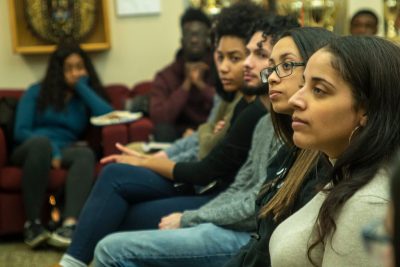
According to Cooper, the book also differs in that it incorporates multiple theoretical lenses to analyze those heterogeneous experiences, focusing on the experiences and outcomes of Black male holistic individuals across their lifespan, rather than only considering their experiences during their athletic careers, as other works do.
In the book, Cooper maps out five socialization models highlighting the multiple systems at play that influence how Black male athletes identify themselves:
- The Illusion of Singular Success Model details the belief among Black male athletes that sport is the only route to success, leading to identity foreclosure after their athletic careers, accompanied by depression, dissatisfaction, emotional trauma, and in some cases, death.
- The Elite Athlete Lottery Model demonstrates the diverse experience of elite athletes, rejecting the popular narrative that all athletes are financially stable once they have reached the professional level. Cooper explains that athletes who make millions in a short-lived athletic career often face bankruptcy after their professional career.
- The Transition Recovery Model describes the process by which Black males are initially socialized to and/or internalize athletic identity salience and engulfment during their athletic careers, but subsequently experience identity transition empowerment after their careers conclude due to exposure and engagement with a range of positive supports. He notes Collective Uplift as an outlet for students to discuss and anticipate the transition into life after sports.
- The Purposeful Participation for Expansive Personal Growth Model underscoreshow sports should be utilized as a means to an end, rather than an end in itself, giving Black males a greater purpose beyond their participation in sport.
- The Holistic Empowerment Model emphasizes the importance of Black male athletes developing a social consciousness about the exploitative systems at play.
Cooper notes his specific focus on Black males was due to his belief in the importance of people who have a personal connection to an experience also authoring texts that describe and explain those experiences. As a former athlete, Cooper experienced an identity crisis after his athletic career ended and he no longer felt successful in anything other than sports. Drawing from that experience, Cooper says he wanted to understand how Black male athletes are being socialized and treated in society.
Aside from those among the general public who are interested in the topic of intersection between sport, education, race, class, culture, and gender, Cooper says his intended audiences for the book are Black male holistic individuals, their families, school administrators, educators, coaches, community members, and undergraduate and graduate-level college students.
“I look at the book as an opportunity to have a paradigm shift in our society around the conversation of the intersection in race, gender, sport, and education,” says Cooper, who has seen Collective Uplift, the organization he founded as a psycho-social support group for Black male athletes, also undergo a shift in a positive direction. With more than 30 members at UConn and more than 20 alumni, Collective Uplift now also has two other chapters — at Old Dominion University and Texas Southern University. Eastern Connecticut State University is looking to begin a chapter as well. Meanwhile, the organization is also making strides in reaching athletes at the youth level.
“It was important for me to not only research this information, but also actively be involved in creating systems and support to improve the outcomes,” Cooper says.
Alexandra Eckhardt ’11 (ED, SFA): She Is Not Throwing Away Her Shot
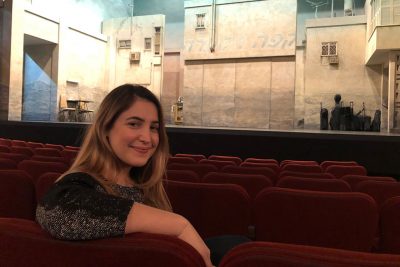
Editor’s Note: The following piece was originally published in the UConn Magazine’s Spring 2019 issue.
When Alexandra Eckhardt ’11 (ED, SFA) was in elementary school her dad taught her to play Earth, Wind & Fire tunes on a four-string, junior-sized electric bass. He also taught her the acoustic bass because she loved low-noted instruments — but even the mini version was a stretch.
“I was this little girl playing this massive instrument,” she says. “Even now if I try to play the bass of some 6-foot-tall guy, my fingers don’t stretch far enough.”
Music is the family’s business (both her parents teach and play) so Eckhardt’s life naturally revolved around music. In high school she joined chorus, band, and orchestra, and then did the same at UConn. Though she chose UConn because she didn’t want to be cloistered in a music conservatory and wanted a more rounded education, she draws a blank when asked what classes she liked outside of music. “Uh, well it wasn’t math,” she says. What she clearly does remember is studying with Errol MacDonald, who heads the jazz department, and jazz bassist Kenny Davis. “Those two guys playing-wise were the dudes for me.”
Though it had never occurred to her to be anything else other than a musician, once Eckhardt had her diploma in jazz studies and music education, she was unsure of how to launch her career. So the newly minted college graduate moved back to her parents’ house in Fairfield, Connecticut, for the summer to ponder her next move. She signed on to play in the band for an elementary school production of the Broadway acorn “Bye, Bye, Birdie” in Chappaqua, N.Y., for a couple of days. It was no career move, but it was a job.
“You are always trying to think of the next thing. Being a freelancer in New York City, you have to have a lot of stamina and hustle.”
— Alexandra Eckhardt ’11 (ED, SFA)
That show’s music director told her of an audition for the touring production of the Broadway musical “In the Heights,” which was created by the team who would go on to produce the mega-hit “Hamilton.” Eckhardt had not yet heard of “In the Heights,” but she auditioned, got the job, packed her suitcase, and quickly learned to play salsa. She spent the next nine months criss-crossing the country with the production, stopping for one-night shows in San Antonio, Des Moines, Fort Lauderdale, and the like. Along the way she launched her career. Suddenly she was a professional musician.
When that tour ended the bassist joined the first national tour of “The Book of Mormon,” the mega Broadway hit created by the writers of the irreverent animated TV series “South Park.” She learned to play fretless bass, which remains her favorite style. The cast and band flew to major cities, where they had multi-week runs. They were fêted with parties at each stop. But life on the road – 8 shows a week, little vacation, living in a hotel room – was still grueling, even for a 20-something.
“The traveling is cool but you get to wanting to be in one place,” she says. “I was ready to start my career in New York if I could.”
Watch Eckhardt accompany Sara Bareilles on “The Late Show with Stephen Colbert”
(Eckhardt is on the far left, behind Bareilles, playing guitar)
As it turned out, she could. Over the past five years, as Eckhardt lugged her five-string electric bass, standing acoustic bass, or both across the city on the subway, her list of playing credits has grown and grown. She subbed in the bands for a dozen-plus Broadway productions, including “Wicked,” “Dear Evan Hansen,” and “Hamilton.” The last, she says, with its bass-heavy, driving score had a big influence on her as a player and taught her endurance. The bassist plays for the show’s entire three hours. “You have to power through and have some granola on your stand,” she says.
Then two years ago, Eckhardt, 30, scored what every freelance musician longs for – a steady gig with a successful show. She holds the bass chair in the pit orchestra of “The Band’s Visit,” one of the most Tony award-winning musicals in history. Starring Tony Shalhoub, “The Band’s Visit” is the story of what happens when an Egyptian band mistakenly happens upon a small Israeli town deep in the desert. The score is flavored with Middle Eastern harmonies and rhythms, something Eckhardt hadn’t played before. “It’s one of the more quiet pieces I’ve played,” she says. “This has been a lesson in restraint.”
Though she has a regular gig, what most musicians dream of, Eckhardt works as if she doesn’t. “The Band’s Visit” is only 90 minutes long, so many nights she packs her bass and heads into the night to play with jazz, pop, or rock bands around the city. She’s performed with a long list of such bands including the soul duo Lipstick Gypsy, the American Idol winner Jordin Sparks, and Irish singer-songwriter Michael Brunnock. She regularly joins singer Sara Bareilles’s band, including in a recent appearance on “The Late Show with Stephen Colbert.” And this is what she likes and doesn’t like about her life — the unpredictability. She says she dreams of being able to make a dinner reservation with her boyfriend, who is a guitarist, but her ever-changing schedule won’t allow it. When either of them gets a chance to play, they take it.
“Even thinking past the next 24 hours is hard to visualize,” she says. “I write down everything carefully. It’s nuts but it’s fun.”
This makes her a versatile player (she also plays the cello and sings backup) and serves to hedge her bets. Even a show as lauded “The Band’s Visit” can close out of the blue, she says. That’s why she played in workshop performances of two Broadway hopefuls this year, one set to the electro pop of British singer-songwriter Kate Nash and directed by Andy Blankenbuehler, the choreographer for “Hamilton.”
“You are always trying to think of the next thing,” she says. “Being a freelancer in New York City, you have to have a lot of stamina and hustle.”
Neag School Accolades: February – March 2019
Congratulations to our Neag School alumni, faculty, staff, and students on their continued accomplishments inside and outside the classroom. If you have an accolade to share, we want to hear from you! Please send any news items and story ideas to neag-communications@uconn.edu.
In addition to the Dean’s Office and Department achievements, explore this edition’s list of Accolades for the following: Faculty/Staff; Alumni; Students, as well as In Memoriam.
Dean’s Office and Departments
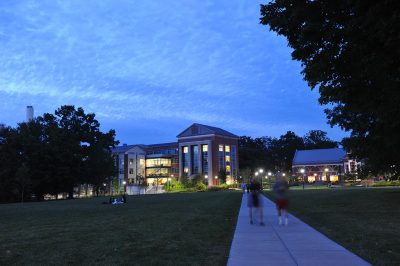
U.S. News & World Report has issued its 2020 rankings of the best graduate schools of education in the nation, with the Neag School ranking among the top 20 public graduate schools of education in the United States for the fourth consecutive year. According to the report, the Neag School ranks No. 30 among all graduate schools of education in the nation, and No. 17 among public graduate schools of education. In addition, five of the Neag School’s specialty programs now place among the top 25 in the United States: special education (No. 16), elementary education (No. 19), educational psychology (No. 19), educational administration (No. 19), and secondary education (No. 22).
The work of 60 Neag School faculty, graduate students, and alumni will be presented next month in Toronto as part of the American Educational Research Association 2019 Annual Meeting. Read more about the Neag School’s presence at meeting, the largest national interdisciplinary research association devoted to the scientific study of education and learning.
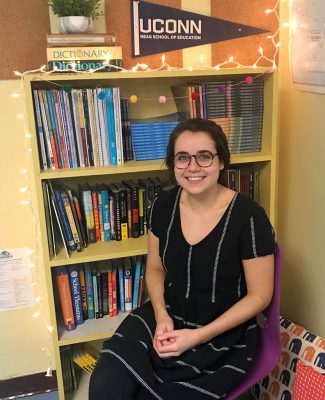
The Neag School Alumni Board selection committee named two Neag School graduate students the recipients of its 2019 Neag School of Education Alumni Board Scholarship: Ashley Robinson, a doctoral student in educational leadership, and Tashua Sotil, a sixth-year graduate student in educational psychology. They are being formally recognized at the 2019 Neag School Alumni Awards Celebration this month.
Alumna Jessica Stargardter ’16 (ED), ’17 MA has been named by the Neag School of Education as the recipient of the 2019 Rogers Educational Innovation Fund award, which provides $5,000 to an elementary or middle-school level teacher in Connecticut for use toward an innovative classroom project. Stargardter serves as a gifted and talented educator for Norwalk (Conn.) Public Schools. She is being formally recognized at this month’s 2019 Neag School Alumni Awards Celebration. A story on her winning the award was featured in The Hour.
Dignitaries from Japan’s Ministry of Education, Culture, Sports, Science, and Technology and from Mitsubishi UFJ Research and Consulting met with Del Siegle last monthto learn about gifted and talented education best practices, as the Ministry has recently developed a five-year education plan that includes promotion of gifted and talented education for the first time at a national level.
Department of Curriculum and Instruction (EDCI) and Teacher Education
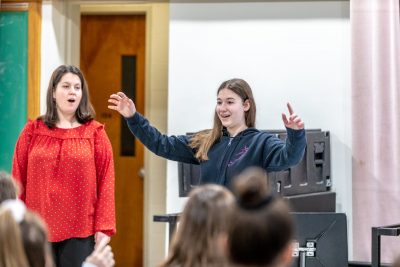
Alumni Katie Cummings ’14 (ED), ’15 MA and Jack Zaino ’14 (ED), ’15 MA brought their students from Swift Middle School in Watertown, Conn., to the UConn Storrs campus in February. Coordinated by Neag School music education assistant clinical professor Cara Bernard, the gathering included visits from current music education students who had the opportunity to work with the young artists; Dominique Battle-Lawson and Mia Hines, academic advisors from the Neag School, who provided a college readiness workshop; and Benjamin Zander, conductor of the Boston Philharmonic Orchestra, who shared his advice about the art of possibility. Check out photos from the visit.
The William Caspar Graustein Memorial Fund announced a new $240,000 grant to advance ongoing Neag School efforts to diversify the teacher workforce. The grant will be used specifically to support stipends to students of color enrolled in the Neag School’s Integrated Bachelor’s/Master’s (IB/M) program.
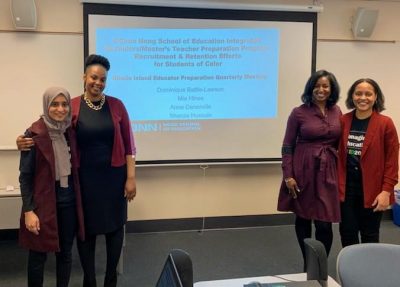
Teacher Education representatives, including Leadership in Diversity’s president, Anne Denerville; and Shanza Hussain, secretary, along with Neag School academic advisors Dominique Battle-Lawson and Mia Hines, visited Rhode Island’s Department of Education earlier this month to share insights into ways of improving recruitment and retention of student candidates of color. In attendance were representatives from Rhode Island College, Roger Williams University, Teach for America, Roger Williams University, Providence College, Johnson and Wales University, Rhode Island School of Design, Principal Residency Network, University of Rhode Island, Brown University, and The Learning Community. View photos from the visit.
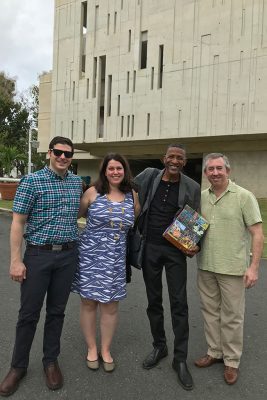
Starting in 2020, the Neag School of Education will offer a music study away program in Puerto Rico, where music education students will get hands-on experience with teaching and playing Puerto Rican music through the guidance of four-time Grammy winning composer, William Cepeda. Joseph Abramo, Cara Bernard, and David Moss recently met with Cepeda in Puerto Rico to plan the new program.
Department of Educational Leadership (EDLR)
Staff from Husky Sport, along with nutritionists from UConn Health, hosted a food demonstration titled “Cooking is an ART form!” at Wish Elementary School in Hartford, Conn. The demonstration included four 30-minute sessions on creating healthy snacks. Husky Sport staff and nutritionists from UConn Health were on-site to offer bilingual instruction and dietary information to families.
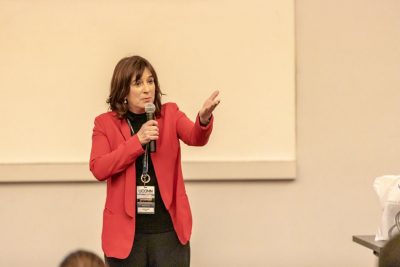
Students in sport management hosted the third annual Sports Business Conference, featuring ESPN’s Carol Stiff, vice president of programming as the keynote speaker. The full-day event, held on the UConn Storrs campus in January, featured workshops, networking, and panel discussions. Mentors from a multitude of companies, ranging from ESPN, Lagardere Sports, the Hartford Yard Goats, and the NBA, led students through case studies. Check out photos.
Sport management students organized a “Beyond the Field” speaker series event featuring Claire Smith, longtime Major League Baseball journalist, on the UConn Storrs campus in February. The event was co-sponsored by the UConn Women’s Center, UConn Athletics, and the African American Cultural Center. View photos from the event.
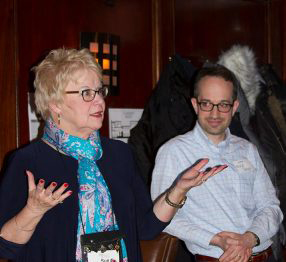
Higher Education and Student Affairs (HESA) hosted a number of networking events for faulty, students, alumni, and friends during the month of March, including at the Student Affairs Administrators in Higher Education national conference in Los Angeles; near the UConn Storrs campus, which included HESA alumni who work at UConn; and an event that occurred as part of the annual American College Personnel Association’s national conference in Boston. There, professor emerita Sue Saunders was awarded the Esther Lloyd-Jones Professional Services Award. See photos from the Boston event.
Department of Educational Psychology (EPSY)
The Center for Behavioral Education and Research (CBER) hosted a Breakfast Brown Bag featuring UConn’s associate vice president for research, Michelle Williams, who gave a talk titled “Creating a Culture of Research at UConn” on the UConn Storrs campus in March.
In honor of Black History Month, the ScHOLA²RS House Living and Learning Community, which is led by faculty advisor Erik Hines, hosted, along with the African American Alumni Council, a networking evening for student scholars and alumni. The event was held at the UConn Storrs campus in February.
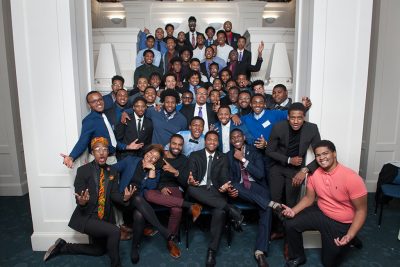
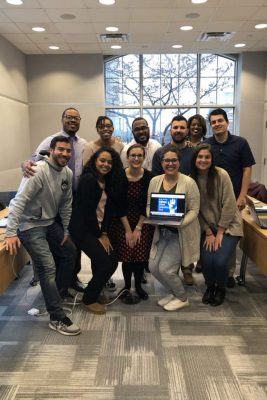
Faculty/Staff
Michele Back wrote an article titled “Teacher Leadership Through Advocacy: The World Language Advocacy Project” for the February/March issue of The Language Educator.
Ronald Beghetto was a featured speaker for UConn’s Institute for Collaboration on Health, Intervention, and Policy (InChip), delivering a talk titled “What If? Engaging in Possibility Thinking with Interdisciplinary Research Teams” for UConn’s Institute for Collaboration on Health, Intervention, and Policy (InChip) on the UConn Storrs campus in February.
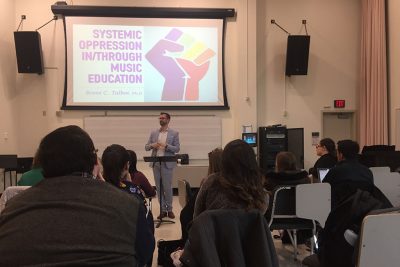
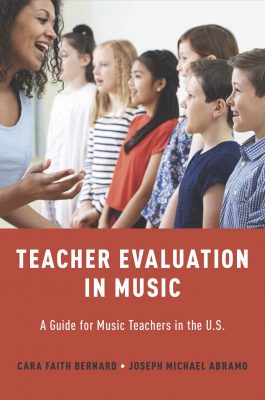
Cara Bernard hosted a visit by Brent Talbot from Gettysburg College to her class of music education students on the UConn Storrs campus in February. In addition, Bernard and Joseph Abramo co-authored a new book titled Teacher Evaluation in Music: A Guide for Music Teachers in the U.S. (Oxford University Press, 2019).
Eric Bernstein co-authored a book chapter titled “Medicolegal and Ethical Considerations in Oral Surgery by the General Dentist,” published this month in the edited volume Evidence-Based Oral Surgery: A Clinical Guide for the General Dental Practitioner (Springer, 2019). He is also is serving on the American Dental Education Association Annual Session Planning Committee, elected to a three-year-term, representing the faculties of all 66 Accredited U.S. Dental Schools and the 10 Accredited Canadian Dental Schools.
Todd Campbell co-published “Passing the Torch; and, A Word From the Incoming Co-Editors-in-Chief” for the January issue of Journal of Science Teacher Education.
Rebecca Campbell-Montalvo co-published “School Employees as Health Care Brokers for Multiply-Marginalized Migrant Families” for the February issue of Medical Anthropology.
Milagros Castillo-Montoya received a $2,000 Scholarship Facilitation Award, from UConn’s Office of the Vice President for Research, for research on teaching through diversity. She also co-published “Teaching Assessment in Student Affairs Through Service Learning” in the winter issue of Research & Practice in Assessment.
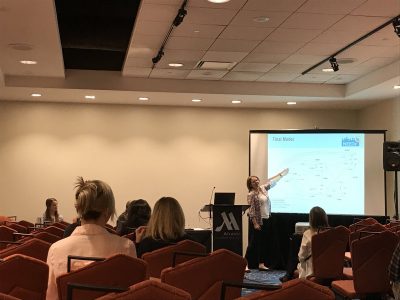
Sandra Chafouleas presented at the National Association of School Psychologists Annual Convention in Atlanta in February.
Sandra Chafouleas, D. Betsy McCoach, and doctoral student Dakota Cintron, along with other colleagues, co-published “Factorial Invariance of the Usage Rating Profile for Supporting Students’ Behavioral Needs (URP-NEEDS)” in February issue. In addition, an article co-authored by Chafouleas and McCoach titled “Methods Matter: A Multi-Trait Multi-Method Analysis of Student Behavior” was recognized by Journal of School Psychology as the runner-up for the 2018 article of the year.
Casey Cobb joined the editorial board of Education Sciences, an international open-access journal. He also started serving on the University Council for Educational Administration’s Program Centers Advisory Board for a three-year term (2019-21).

Joseph Cooper celebrated the launch of his new book, From Exploitation Back to Empowerment: Black Male Holistic (Under)Development Through Sport and (Mis)Education (Peter Lang, 2019) on the UConn Storrs campus and in Hartford in February. View photos from the Storrs event, and read more here. Also, he was the keynote speaker for the 2019 Active Citizenship Dinner, hosted by the UConn Community Outreach on the UConn Storrs campus in January, and he gave an opening address for the MLK Day of Service event on the UConn Storrs campus in February.
Michael Coyne and D. Betsy McCoach’s co-published article titled “Racing Against the Vocabulary Gap: Matthew Effects in Early Vocabulary Instruction and Intervention” was featured in the Marshall Memo in January.
Michael Coyne presented “The Importance of Teaching Vocabulary Within a Structured Approach” at Southport School, in Southport, Conn., in March.
Morgaen Donaldson was featured on the Department of Educational Leadership’s website.
Preston Green co-wrote an original commentary titled “Charter Schools Exploit Lucrative Loophole That Would be Easy to Close” for The Conversation and was featured in UConn Today in regard to a new report he co-authored on charter school equity published by The Century Foundation.
James Kaufman delivered a keynote titled “The Science Behind the Art: How Everyone Can be Creative, and Why it Matters” as part of an exhibit opening at the Silvermine Art Center in New Canaan, Conn., in February. Kaufman also published “Uniquely Creative: Developing a New Outline for Positive Outcomes” and “Creativity’s Need for Relevance in Research and Real Life: Let’s Set a New Agenda for Positive Outcomes” for the December issue of Creativity, was a co-publisher of “Advancing Creativity Theory and Research: A Socio-cultural Manifesto” for the January issue of the Journal of Creative Behavior, and co-published a chapter titled “The Relation of Creativity to Intelligence and Wisdom” for The Cambridge Handbook of Creativity (Cambridge University Press, 2019), for which he also served as editor. He presented “Why Creativity? Toward Better and Newer Positive Outcomes” at Rice University in Houston in February and participated with a masterclass on the psychology of creativity over Skype with the University of Alabama in March.
Devin Kearns co-published “The Role of Semantic Information in Children’s Word Reading: Does Meaning Affect Readers’ Ability to Say Polysyllabic Words Aloud?” for the January issue of the Journal of Educational Psychology. He also co-presented a webinar titled “To Be Clear: What Every Educator Needs to Know About Explicit Instruction” for the National Center on Intensive Intervention in February and the National Center on Intensive Intervention’s Everyone Reading Conference at City University New York, N.Y., in March. In addition, he appeared at the Council for Exceptional Children’s Special Education Convention in January as a panelist for a discussion titled “Dyslexia: A Conversation About Aligning Practice With Research and Legislation.” His co-authored study “The Neurobiology of Dyslexia” was published in the January issue of Teaching Exceptional Children and subsequently featured in the Marshall Memo.
Tamika La Salle is a co-PI for a new National Institute of Minority Health and Health Disparities grant titled “Reducing Youth Violence and Racism/Discrimination: The Efficacy of Comprehensive Prevention Strategies (CPS).” The grant is a five-year, $2.4 million award with the UConn sub-award of about $250,000. The grant is in collaboration with University of Alabama researchers and will focus on middle school students in Alabama.
Professor Emeritus Donald Leu co-published “Exploring the Collaborative Synthesis of Information During Online Reading” for the June issue of Computers in Human Behavior.
Allison Lombardi co-presented “Main and Moderating Effects of an Online Transition Curriculum on Career Readiness” with graduate student Graham Rifenbark at the 2019 Pacific Rim International Conference on Disability and Diversity at Honolulu this month.
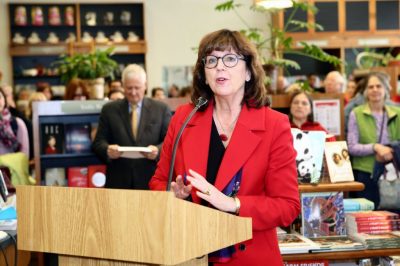
Jennifer Michno, Jennie Weiner, Laura Burton, and doctoral student Daron Cyr were featured on the Department of Educational Leadership’s website for their research on administration preparation.
Kenny Nienhusser co-published “Awakened Hatred and Heightened Fears: ‘The Trump Effect’ on the Everyday Lives of Mixed-Status Families” for the December issue of Cultural Studies Critical Methodologies.
Joseph Renzulli was recognized among Global Gurus’ Top 30 Education Professionals for 2019 (No. 12). Also, he and Sally Reis were keynote speakers at the California Association for the Gifted’s annual conference in Palm Springs, Calif., in February. Last month, they were the featured speakers at the 2019 International Congress of Enriching Outstanding Minds, held in Mexico. Research on schoolwide enrichment by Joseph Renzulli and Sally Reis was featured by The Century Foundation.
Christopher Rhoads received the first Connecticut Faculty Mobility Grant funded by the Baden-Württemberg’s Ministry of Science, Research, and the Arts.
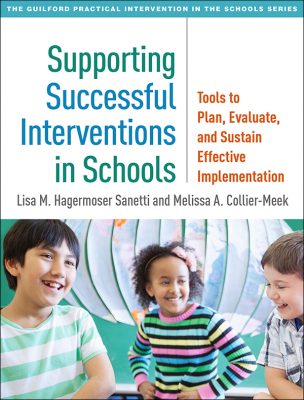 Lisa Sanetti co-published with alumna Melissa Collier-Meek ’08 (CLAS), ’09 MA, ’11 6th Year, ’13 Ph.D. Supporting Successful Interventions in Schools (Guilford Press, 2019). They also co-published with other colleagues “Evaluating Implementation Supports Delivered Within Problem-Solving Consultation” for the February issue of the Journal of School Psychology.
Lisa Sanetti co-published with alumna Melissa Collier-Meek ’08 (CLAS), ’09 MA, ’11 6th Year, ’13 Ph.D. Supporting Successful Interventions in Schools (Guilford Press, 2019). They also co-published with other colleagues “Evaluating Implementation Supports Delivered Within Problem-Solving Consultation” for the February issue of the Journal of School Psychology.
Richard Schwab served as a panelist with Robert Villanova, along with Neag School alumni Carol D. Birks ’08 ELP and Michael T. Connor ’14 ELP, and others at Shipman & Goodwin’s community series, “The Achievement Gap: Legal and Educational Challenges” in Hartford, Conn., in February. Schwab was also featured on the Department of Educational Leadership website in a piece about his innovative course where students work on getting op-eds published.
Research and work on gifted and talented by the National Center for Research on Gifted Education (NCRGE), led by Del Siegle, is featured in District Administration here and here. In addition, Siegle spoke this month about NCRGE’s findings on strategies to increase equity at the National Association for Gifted Children’s Leadership & Advocacy Conference in Washington, D.C. At Vanderbilt University’s Differentiation for Gifted Learners Conference in Nashville, he gave a keynote titled “Addressing Low Motivation in Students” and made a presentation titled “Research Is More Than Googling: Using Technology to Conduct Authentic Research.”
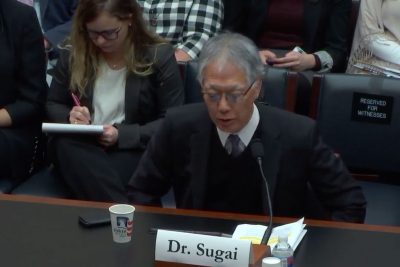
George Sugai testified about the use of restraint and seclusion in schools before the U.S. House of Representatives’ subcommittee on Early Childhood, Elementary and Secondary Education, at the Rayburn House Office Building in February in Washington, D.C.
Jennie Weiner co-published “Control as Care: How Teachers in ‘No Excuses’ Charter Schools Position Their Students and Themselves” for the February issue of Equity and Excellence in Education. In addition, through a $50,000 grant from the Spencer Foundation, Weiner and Laura Burton will investigate how microaggressions and discrimination affect the experiences of 25 black female principals.
Sarah Woulfin co-published “Got Theory?: Reconceptualizing the Nature of the Theory-Practice Gap in K-12 Educational Leadership” for the January issue of the Journal of Educational Administration. She also co-published a chapter for the book Educational Leadership, Organizational Learning, and the Ideas of Karl Weick (Taylor and Francis, 2019).
Students
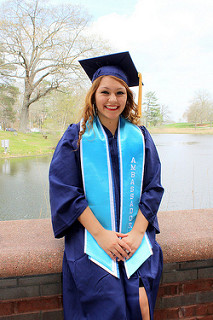
Kelly Chuquihuanca, a student in the Teacher Certification Program for College Graduates, was featured in the College of Agriculture and Natural Resources’ blog, Naturally@UConn.
Miguel Colón, a master’s student in sport management, was featured on the Department of Educational Leadership’s website.
Jesús Cortés-Sanchez ’18 (ED, SFA), ’19 MA performed on the Grammy-winning album “American Dreamers (Voices of Hope, Music of Freedom).” He was one of the 53 musicians on the album.
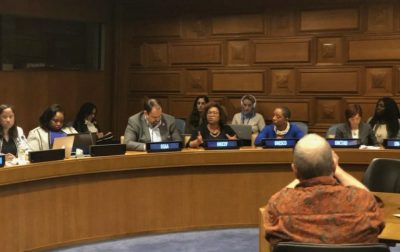
Monique Golden, a doctoral student in educational leadership, was a co-presenter with Sabrina Tucker-Barrett, founder and CEO of Girls for Technology (GFT), at the Annual International Women’s Day event at the United Nations in New York, N.Y., earlier this month. Golden has been working with GFT, a local nonprofit seeking to promote STEM engagement for youth girls of color via educational programming, trips, summer programs, and competitions.
Shannon Holder, a doctoral student in educational leadership, is co-hosting a new podcast titled “The Hidden Curriculum,” launched by the University Council for Educational Administration’s Graduate Student Council. The podcast will focus on topics in educational policy, leadership, and administration.
Denée Jackson, a master’s degree student in higher education and student affairs, was featured on the Department of Educational Leadership’s website.
Diana Kelley, a doctoral student in educational leadership, was featured on the Department of Educational Leadership’s website.
Taylor Koriakin and Emily Auerbach, doctoral students in educational psychology, along with Sandra Chafouleas, co-presented “Meeting the Needs of the Whole Child” at the National Association of School Psychologists Annual Convention in Atlanta in February.
Kaitlin Leonard, a doctoral student in educational psychology, co-presented “Attendance and Response to Intervention: The Effects of Intervention Dosage and Exposure on Reading Achievement” at the National Center for Leadership in Intensive Intervention’s Council for Exceptional Children Special Education Convention and Expo in Indianapolis, along with Michael Coyne and Taylor Koriakin.
Grace Mandy, an English education student and volunteer at the UConn Women’s Center, was profiled in The Daily Campus.
Marissa Nazarro, a junior elementary education student and mentor for UConn’s First Year Programs and Learning Communities, was elected to UConn’s Student Government’s 2019 Executive Board.
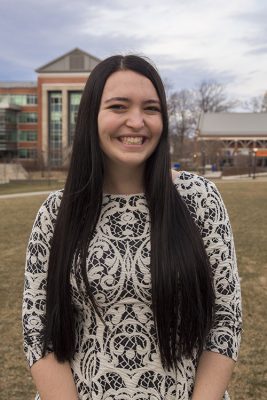
Ajhanai (AJ) Newton, a doctoral student in sport management, co-published her first article with Joseph Cooper, for The Journal of Negro Education.
Jesslynn Rocha Neves, a doctoral student in school psychology, received the Trainers of School Psychology Graduate Award at the National Association of School Psychologists’ Annual Convention in Atlanta last month.
Natasha Schweitzer, a secondary English education major and volunteer for the UConn Writing Center, was featured in The Daily Campus.
Alumni
Emily Armstrong ’16 (ED), ’17 MA has signed a letter of intent to join Sundsvalls, a professional women soccer team in Sweden.
Susan Baum ’85 Ph.D. presented at the California Association for the Gifted’s annual conference in Palm Springs, Calif., in February.
Jon Dahlquist ’03 (ED), ’05 MA (CAHNR) was appointed dean of wellness and athletics at East Catholic (Conn.) High School. He previously worked as associate athletic director for Towson University in Maryland.
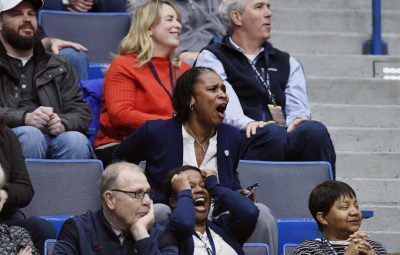
Jamelle Elliott ’96 (BUS), ’98 MA UConn’s associate athletic director for the National C Club, was featured in the Connecticut Post.
Sandi Hastings ’89 MA, ’94 Ph.D. was featured on the UConn Foundation website in regard to a new Global Education Scholarship that will support study abroad opportunities for female students in the Neag School’s IB/M program.
Nina Klein ’17 (CLAS), ’18 MA, Quinnipiac University’s assistant field hockey coach, is joining the U-21 U.S. Women’s National Team and Development Squad roster. She will be joining the training camps in preparation for their international tour to Germany in April.
Jennifer Parzych ’13 PhD., a faculty member at Southern Connecticut State University, presented at the American School Counselor Association “Impact and Influence of School Counselors” event in Washington, D.C., in February.
Chloe Pavlech’18 MS wrote an article for Medium. A former member of the UConn women’s basketball team, she is the talent and digital content manager for Overtime and a women’s basketball analyst for ESPN.
Kaitlin Roig-DeBellis’05 (ED), ’06 MA, founder of nonprofit Classes 4 Classes and survivor of the 2012 school shooting in Newtown, Conn., is being recognized with an honorary degree from Muhlenberg College. She will receive the degree at their Commencement ceremony in May in Allentown, Pa.
Loretta Rubin ’96 6th Year, an alumna of the UConn Administrator Preparation Program (UCAPP), was featured on the Department of Educational Leadership’s website.
Doug Shearer ’13 (ED) was named the special teams coordinator for the Miami University Red Hawks.

Michael A. Smith ’08 MS, a gifted support teacher at Warwick Middle School in Lilitz, PA, led a group of middle school students to win the grand prize out of 1,500 schools at the “2019 Future City Competition” in Washington, D.C. He has coached the team over the last 13 years, and has placed nationally a few times over those years.
Danielle Upham ’12 (ED), ’16 MS has been named the associate director of athletics for facilities, events, and operations at the University of Hartford. Most recently, she worked at UConn as director of event management.
In Memoriam
Karen E. Adamson ’79
Evelyn S. Albert ’80
Helen Anita (Dressen) Bacon
Jean T. Barlow ’47
Joan D. Burnett ’68
William J. Carrington, Jr. ’60
Winifred S. Curtis ’50
Rosemary (Miceli) Jakobsen
John D. Lineen ’77
Philip L. Mountain ’71
Judith F. Neubauer ’61
Joan A. O’Connor ’89
Pamela H. Potterton ’79
Helen W. Robords ’44
Thomas J. Serra ’72
Raymond H. Tanguay ’65
Ruth E. Von Euw ’57
Richard Whiteside ’04
Neag School Faculty, Students, Alumni to Present Research at AERA 2019

This April, the American Educational Research Association (AERA)’s Annual Meeting will be collaborating with the Canadian Society for the Study of Education and the World Education Research Association to travel to Toronto, Canada. There, education research work by 60 faculty researchers, graduate students, and alumni from UConn’s Neag School of Education will be featured.
With upwards of 14,000 scholars, policy experts, practitioners, and AERA members in attendance, the AERA Annual Meeting is the largest gathering of education researchers in the world. Taking place April 5 to 9, it will include upwards of 2,600 sessions focused on the theme of “Leveraging Education Research in a ‘Post-Truth’ Era: Multimodal Narratives to Democratize Evidence.”
Neag School-affiliated attendees will be presenting research papers; leading professional development seminars; taking part in roundtable and panel discussions; speaking on key issues; and accepting awards from various divisions of the AERA.
AERA is a national research society that strives to advance knowledge about education, to encourage scholarly inquiry related to education, and to promote the use of research to improve education and serve the public good.
